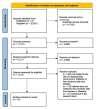Does Type 2 Diabetes Increase the Risk of Hepatocellular Carcinoma in Nonalcoholic Fatty Liver Disease Patients? A Systematic Review
- PMID: 37065332
- PMCID: PMC10101195
- DOI: 10.7759/cureus.36079
Does Type 2 Diabetes Increase the Risk of Hepatocellular Carcinoma in Nonalcoholic Fatty Liver Disease Patients? A Systematic Review
Abstract
Diabetes is associated with different types of cancers of which hepatocellular carcinoma (HCC) is one among them. In a study comparing patients with diabetes to those who do not have diabetes, it was evident that the risk of HCC is found to increase two-fold in diabetic than that in non-diabetic patients. It is clear that carcinogenesis is advanced due to diabetes in the liver by a variety of mechanisms. We searched PubMed and Google Scholar for articles from 2010 to 2021 that have an association between diabetes, nonalcoholic fatty liver disease (NAFLD), and HCC. For the development of HCC, diabetes is likely related at both the molecular and epidemiological levels. Both diabetes mellitus and hepatic malignancy have the worst impact on mankind socioeconomically. There is a significant relationship between diabetes and HCC independent of alcohol consumption and viral hepatitis. It is noteworthy that not only the elderly but also people of all age groups should monitor their hemoglobin A1C levels. Diet restriction and lifestyle modification can reduce the risk of complications like HCC; the increased physical activity itself can have a major influence on health and can manage comorbidities like diabetes, NAFLD, and HCC.
Keywords: diabetes; diabetes mellitus type 2; hepatocellular carcinoma (hcc); insulin resistance; non alcoholic fatty liver disease.
Copyright © 2023, Venugopal et al.
Conflict of interest statement
The authors have declared that no competing interests exist.
Figures



Similar articles
-
Nonalcoholic fatty liver disease, metabolic risk factors, and hepatocellular carcinoma: an open question.World J Gastroenterol. 2015 Apr 14;21(14):4103-10. doi: 10.3748/wjg.v21.i14.4103. World J Gastroenterol. 2015. PMID: 25892859 Free PMC article. Review.
-
Screening and interventions to prevent nonalcoholic fatty liver disease/nonalcoholic steatohepatitis-associated hepatocellular carcinoma.World J Gastroenterol. 2023 Jan 14;29(2):286-309. doi: 10.3748/wjg.v29.i2.286. World J Gastroenterol. 2023. PMID: 36687124 Free PMC article. Review.
-
Increased prevalence but decreased survival of nonviral hepatocellular carcinoma compared to viral hepatocellular carcinoma in recent ten years.Sci Rep. 2024 Apr 20;14(1):9068. doi: 10.1038/s41598-024-59668-2. Sci Rep. 2024. PMID: 38643245 Free PMC article.
-
Differentiation of clinical patterns and survival outcomes of hepatocellular carcinoma on hepatitis B and nonalcoholic fatty liver disease.J Chin Med Assoc. 2021 Jun 1;84(6):606-613. doi: 10.1097/JCMA.0000000000000530. J Chin Med Assoc. 2021. PMID: 33871391
-
Association of metabolic traits with occurrence of nonalcoholic fatty liver disease-related hepatocellular carcinoma: A systematic review and meta-analysis of longitudinal cohort studies.Saudi J Gastroenterol. 2022 Mar-Apr;28(2):92-100. doi: 10.4103/sjg.sjg_260_21. Saudi J Gastroenterol. 2022. PMID: 34810377 Free PMC article.
Cited by
-
Both Maternal High-Fat and Post-Weaning High-Carbohydrate Diets Increase Rates of Spontaneous Hepatocellular Carcinoma in Aged-Mouse Offspring.Nutrients. 2024 Aug 22;16(16):2805. doi: 10.3390/nu16162805. Nutrients. 2024. PMID: 39203941 Free PMC article.
References
-
- Comparing clinical presentations, treatments and outcomes of hepatocellular carcinoma due to hepatitis C and non-alcoholic fatty liver disease. Than NN, Ghazanfar A, Hodson J, et al. https://doi.org/10.1093/qjmed/hcw151. QJM. 2017;110:73–81. - PMC - PubMed
-
- Hepatocellular carcinoma is the most common liver-related complication in patients with histopathologically-confirmed NAFLD in Japan. Akuta N, Kawamura Y, Arase Y, et al. https://bmcgastroenterol.biomedcentral.com/articles/10.1186/s12876-018-0.... BMC Gastroenterol. 2018;18:165. - PMC - PubMed
Publication types
LinkOut - more resources
Full Text Sources
